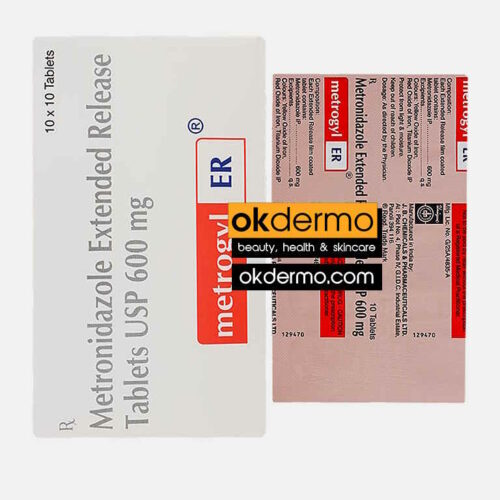Metronidazole Tablets: Uses, Dosage, Side Effects
Table of Contents
Brand names like Flagyl, Flagyl ER, and Likmez know metronidazole. It is a multipurpose antibiotic that can be used to treat infections in the skin, joints, stomach, liver, and vagina. In this article, we explore the uses, dosage, and potential side effects of metronidazole, highlighting its mechanisms and precautions.
What Metronidazole is Used For?
Metronidazole is an antibiotic for various infections affecting different parts of the body. It is approved for the treatment of asexual trichomonas, a sexually transmitted infection, as well as, in certain situations, asymptomatic trichomonas. Furthermore, metronidazole plays an important part in the fight against anaerobic bacterial infections, bacteria that grow in oxygen-free conditions, and parasite-borne diseases such as amebiasis.
How Does Metronidazole Work?
The efficacy of metronidazole lies in its ability to diffuse into the cytoplasm of anaerobic bacteria, where it undergoes activation and reduction. This transformation results in a short-lived nitroso free radical that interacts with DNA, causing structural damage, strand breakage, and eventual bacterial death. While metronidazole starts working quickly, noticeable symptom improvements can take a couple of days. It is essential to complete the prescribed course to ensure the complete eradication of the infection.
Warnings and Precautions of Metronidazole
Although metronidazole is a useful medication, it must be used with precaution and warnings must be followed. It is essential to take metronidazole only for problems confirmed by a healthcare provider to prevent the emergence of drug-resistant bacteria. Notably, the medication is contraindicated if alcohol has been consumed recently or if disulfiram has been taken in the past two weeks. If you get seizures or neurological symptoms such as headaches, vision abnormalities, or weakness, you must stop taking metronidazole right immediately.
-

Metronidazole Gel
Metronidazole Gel 0.75% / 2%
Brand name: Flagyl, Anabact, Metrogel, Zyomet, Nuvessa, Rosaclear, Rozex
From USD $21.00 Select options -

Metrogyl® Metronidazole Tablets
Metronidazole 200mg / 400mg / 600mg
Size: 30 Tablets
Brand name: Flagyl, Noritate, Vandazole, Protostat, Metro, Metizol
From USD $28.00 Select options -

Metrohex® Chlorhexidine Oral Gel
Chlorhexidine Gluconate 0.25% + Metronidazole 1%
Size: 20g / 0.7oz
Brand name: Metrocream, Metrogel, Metrolotion, Noritate, Rosadan, Rozex, Vitazol
USD $17.00 Add to cart
Important Considerations of Metronidazole
It is required of patients to divulge any pertinent medical information, such as heartbeat problems, liver or kidney disease, and blood cell disorders, before starting metronidazole medication. Pregnant and breastfeeding also should consult their healthcare provider, weighing the potential risks and benefits of metronidazole during these periods. Metronidazole is not approved for treating vaginal infections in girls who have not started their period.
Dosage and Treatment of Metronidazole
The dosage of metronidazole changes according to the infection that needs to be treated. It may be advised to treat trichomoniasis with a single oral dose or two doses given on the same day. It can be advised to treat trichomoniasis with a single oral dose or two doses given on the same day. The dosage should be adjusted for individuals with severe hepatic impairment or those undergoing hemodialysis.
Usage of Metronidazole
Metronidazole can be used orally, intravenously, or topically. Oral forms include tablets and capsules, with the option of extended-release tablets. The medication can also be given intravenously in certain cases. Treatment duration varies based on the type of infection, ranging from a single dose to a 10-day course.
Metrogyl with 2% metronidazole gel also known as Flagyl gel. Metrogyl contains metronidazole 2 percent anti-inflammatory active component and it is used for Inflammatory papules and pustules of rosacea, pressure sores, and vaginal, and oral/dental bacterial infections. Metrogyl gel works by producing an anti-inflammatory effect, metronidazole 2% topical treats genital infections like bacterial vaginosis and gonorrhea but not this particular gel, Metrogyl gel is a topical gel. It does not cure chlamydia or vaginal yeast infections.
What to Avoid During Metronidazole Treatment?
Alcohol consumption or the use of products containing propylene glycol is strictly discouraged during metronidazole treatment and for at least 3 days after completing the course. The combination can lead to unpleasant effects such as headaches, nausea, vomiting, and stomach cramps.
Side Effects of Metronidazole
While metronidazole is generally well-tolerated, it can cause side effects. Allergic reactions, including itching, hives, and skin rash, can occur. It can be nervous system problems, worsening yeast infections, and low white blood cell count are potential complications. The most common side effects include diarrhea, nausea, headache, and abdominal pain.
Missed Doses and Overdose
In the case of a missed dose, the medication should be taken as soon as possible, but if it’s almost time for the next dose, doubling up should be avoided. Additionally, overdose symptoms that need to be treated right once include nausea, vomiting, tingling, numbness, and issues with balance or muscle function.
Drug Interactions
Metronidazole can interact with various medications, including antidepressants, asthma medications, cancer medications, and blood thinners. It is important to inform healthcare providers about all current medications to avoid potential complications.
Storage and Disposal
Metronidazole should be stored at room temperature, away from moisture and heat. Ten days after launching any unused suspension should be thrown away. It is essential to keep the medication out of reach of children.
Conclusion
Metronidazole is an important antibiotic with a broad spectrum of applications. You must understand how to use this medication safely and successfully, including its mechanism of action, dose recommendations, and any side effects. The best use of metronidazole in the treatment of infections is dependent on following recommended courses of action, avoiding alcohol while receiving treatment, and maintaining open lines of communication with medical professionals.
Disclaimer: This article aims to give you an informative guide, and should not replace professional medical advice. So, you have to consult your healthcare providers for personalized guidance.
Frequently Asked Questions
Can I drink alcohol while on metronidazole?
No, alcohol should be strictly avoided during metronidazole treatment and for at least 3 days after the last dose to prevent adverse reactions.
What are the common side effects of metronidazole?
The common side effects include diarrhea, nausea, headache, and abdominal pain. Severe neurological symptoms or worsening yeast infections may occur.
Is metronidazole safe during pregnancy?
While generally considered safe, discuss with your doctor about potential risks and benefits. Some studies suggest caution, particularly in the first trimester.
How should I take metronidazole?
Follow your doctor’s prescription carefully. Oral forms can be taken with or without food, while the injection is administered intravenously by a healthcare provider.
References:
- Sastry, S., & Bhat, S. (2010). Metronidazole. In: StatPearls [Internet]. StatPearls Publishing.
- Metronidazole: Drug Information. (2022). Lexi-Drugs. Lexicomp.
- (2021). LiverTox: Clinical and Research Information on Drug-Induced Liver Injury. National Institute of Diabetes and Digestive and Kidney Diseases.
Post by:
Marcella Jiovanni
Skin Care Professional
“Marcella Jiovanni actively promotes the importance of maintaining healthy skin, she envisions the future of dermatology as moving away from pure medical, pharmacological dermatology and flowing more toward a holistic approach to wellness and skincare.”


















